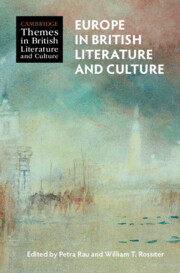Book contents
- Europe in British Literature and Culture
- Cambridge Themes in British Literature and Culture
- Europe in British Literature and Culture
- Copyright page
- Contents
- Illustrations
- Contributors
- General Editor’s Preface
- Acknowledgements
- Introduction
- Part I Zones of Influence
- Part II Pan-European Moods and Movements
- Part III Cultural Transfers
- Chapter 12 Early Modern Print Technologies
- Chapter 13 Diplomacy
- Chapter 14 Grand Tours and Sentimental Journeys
- Chapter 15 Folk and Fairy Tales
- Chapter 16 Translation
- Chapter 17 More or Less English
- Chapter 18 Holocaust Education and Commemoration in Britain
- Chapter 19 Critical and Literary Theory
- Chapter 20 Culinary Longings
- Part IV Anxious Neighbourhoods, Uncertain Futures
- Index
Chapter 16 - Translation
from Part III - Cultural Transfers
Published online by Cambridge University Press: aN Invalid Date NaN
- Europe in British Literature and Culture
- Cambridge Themes in British Literature and Culture
- Europe in British Literature and Culture
- Copyright page
- Contents
- Illustrations
- Contributors
- General Editor’s Preface
- Acknowledgements
- Introduction
- Part I Zones of Influence
- Part II Pan-European Moods and Movements
- Part III Cultural Transfers
- Chapter 12 Early Modern Print Technologies
- Chapter 13 Diplomacy
- Chapter 14 Grand Tours and Sentimental Journeys
- Chapter 15 Folk and Fairy Tales
- Chapter 16 Translation
- Chapter 17 More or Less English
- Chapter 18 Holocaust Education and Commemoration in Britain
- Chapter 19 Critical and Literary Theory
- Chapter 20 Culinary Longings
- Part IV Anxious Neighbourhoods, Uncertain Futures
- Index
Summary
Before Chaucer became ‘the Father of English Poetry’, the French poet Eustace Deschamps had called him ’Grant translateur’. In fact, Chaucer was the fons et origo of the English poetic tradition precisely because he was the Great Translator, because the history of English literature is also the history of European translation. Beginning with the medieval practice of translatio, whereby source and commentary fused into the new work, this chapter charts the contested views of translation from primary mode of making, to secondary exercise, back to primary production as literary translation reaffirms its centrality to the literary polysystem. It also traces the rise of the professional translator, the evolution of the literary translator, and translation studies as a discipline predicated on the development of translation theory. While Dryden in the seventeenth century could draw crucial distinctions between modes of translation, the development of translation as a formal and theorized practice (exemplified by Schleiermacher in early nineteenth-century Germany) could not be disassociated from the efflorescence of national literatures, pace Goethe, the Romantics, and George Eliot.
Keywords
- Type
- Chapter
- Information
- Europe in British Literature and Culture , pp. 259 - 274Publisher: Cambridge University PressPrint publication year: 2024



